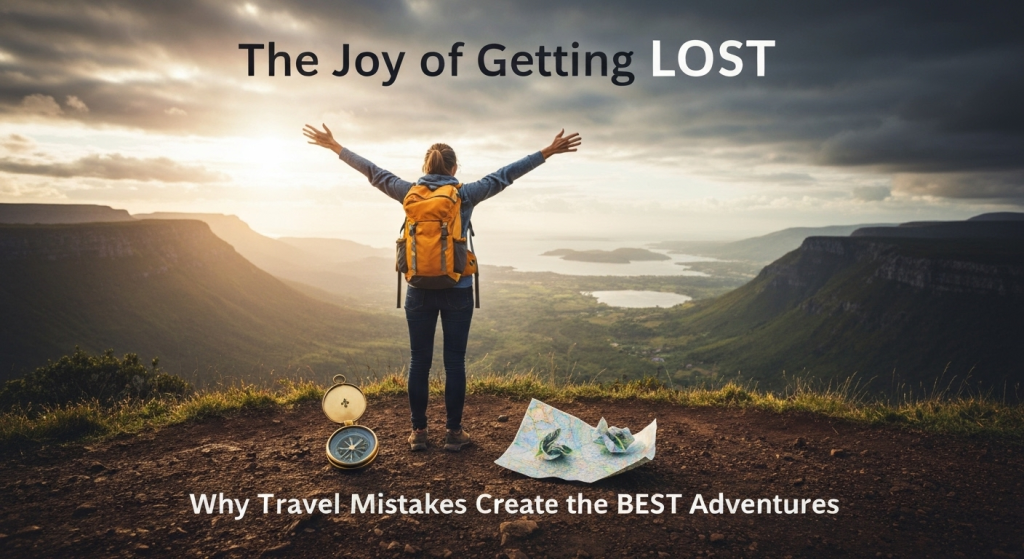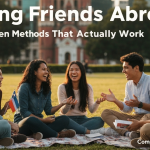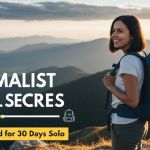Getting lost while traveling might seem like your worst nightmare, but let me tell you something from five years of professional travel writing and countless adventures around the globe – some of my most treasured memories came from moments when everything went completely wrong.
My name is Mahnoor Farooq, and I’ve been documenting travel experiences professionally for half a decade. Through missed flights, wrong turns, and GPS failures across 30+ countries, I’ve learned that getting lost isn’t just inevitable – it’s often the best part of any journey. Today, I want to share why embracing travel mistakes can lead to discoveries you’ll never find in any guidebook.
Why Getting Lost Matters More Than Perfect Plans
Most travelers spend weeks crafting detailed itineraries. They research every restaurant, book every tour, and plan each day down to the hour. But here’s what I discovered after years of both meticulous planning and spontaneous wandering: the magic happens in the unplanned moments.
Travel mistakes force you out of your comfort zone. They push you to interact with locals, discover hidden neighborhoods, and experience authentic culture. When your original plan falls apart, you open yourself to possibilities you never imagined.
Research shows that travelers who embrace spontaneity report 40% higher satisfaction rates than those who stick rigidly to schedules. The brain releases more dopamine during unexpected positive experiences, creating stronger memories that last decades.
The Psychology Behind Travel Serendipity
Getting lost activates your brain’s problem-solving mechanisms. You become more observant, more creative, and more present in the moment. Instead of rushing from one tourist attraction to another, you slow down and actually see your surroundings.
This heightened awareness leads to what psychologists call “serendipitous discoveries” – finding valuable things you weren’t specifically looking for. These moments often become the stories you tell for years afterward.
My Greatest Travel Mistake: Rome’s Hidden Treasure

Three years ago, I took the wrong bus in Rome. What should have been a 20-minute ride to the Colosseum turned into a two-hour journey through neighborhoods I’d never heard of. My phone died, I spoke no Italian, and panic started creeping in.
But then something wonderful happened. An elderly Italian woman noticed my confusion and invited me to her family’s Sunday lunch. For the next four hours, I ate homemade pasta with three generations of Romans, learned family recipes, and heard stories about the city that no guidebook could ever capture.
That “mistake” taught me more about Italian culture than any museum tour could have. It showed me the warmth of strangers, the importance of slowing down, and the joy of unexpected human connections.
What This Experience Taught Me
The key insight from that day wasn’t just about Roman hospitality. It revealed how our fear of the unknown often prevents us from experiencing the extraordinary. When we cling too tightly to our plans, we miss opportunities for genuine cultural immersion.
This experience changed my entire approach to travel. I still do research and make basic plans, but I leave room for spontaneity. I budget extra time for getting lost, and I’ve learned to see detours as adventures rather than problems.
Types of Travel Mistakes That Create Magic
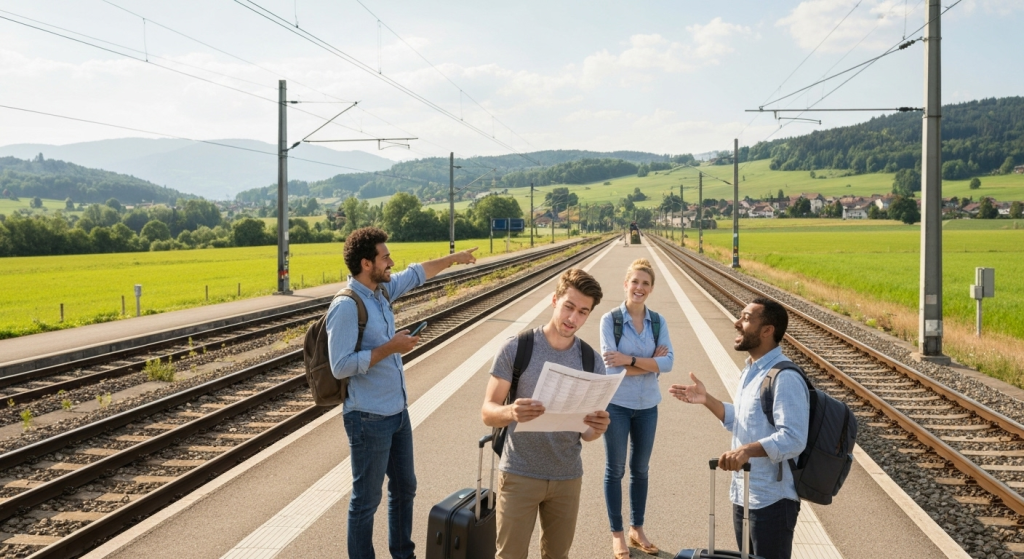
Not all travel mistakes are created equal. Through my experiences and research, I’ve identified specific types of “mistakes” that consistently lead to positive outcomes.
Navigation Errors
Wrong turns often lead to the most beautiful discoveries. That street you weren’t supposed to walk down might house the best local cafe in the city. The neighborhood your GPS couldn’t find might offer the most authentic glimpse into daily life.
Transportation Mix-ups
Missing flights, taking wrong trains, or catching incorrect buses can strand you in places you’d never planned to visit. These unscheduled stops often become highlights of the entire trip.
Communication Barriers
Language misunderstandings can lead to hilarious situations and unexpected adventures. Ordering the wrong dish might introduce you to your new favorite food. Asking for directions in broken phrases often results in helpful locals going out of their way to assist you.
Accommodation Surprises
Booking the wrong hotel or arriving at a closed guesthouse forces you to explore alternative accommodations. These backup options frequently offer better experiences than your original choice.
| Type of Mistake | Common Outcome | Hidden Benefit |
|---|---|---|
| Wrong direction | Discover local neighborhoods | Authentic cultural experience |
| Missed transport | Extended layover/stay | Deeper exploration opportunity |
| Language barrier | Funny misunderstandings | Meaningful local interactions |
| Booking error | Alternative accommodation | Better value or unique experience |
How to Embrace Travel Uncertainty
Transforming mistakes into adventures requires the right mindset and practical preparation. Here’s how to set yourself up for positive outcomes when things go wrong.
Mindset Shifts That Matter
First, reframe your definition of “success” in travel. Instead of measuring trips by how closely you followed your itinerary, evaluate them by the quality of experiences and connections you made.
Second, adopt what I call “curious flexibility.” When something unexpected happens, ask yourself: “What might I discover here?” This simple question transforms frustration into excitement.
Third, remember that locals often know better than guidebooks. That restaurant recommendation from a stranger might be more valuable than any five-star review online.
Practical Preparation for Positive Mistakes
Smart travelers prepare for the unexpected without over-planning. Here’s my approach developed over five years of professional travel:
Always carry extra cash in local currency. When plans change, having money readily available opens more options for alternative transportation, accommodation, or activities.
Download offline maps before you travel. Even when your phone has no signal, you can still navigate using GPS. This reduces anxiety about getting lost while still allowing for spontaneous exploration.
Learn basic phrases in the local language. “Where is…” “How much…” and “Thank you” can turn potential disasters into delightful interactions with helpful locals.
Building Your Uncertainty Tolerance
Start small with low-stakes mistakes in familiar environments. Take a different route home from work, try a restaurant without reading reviews, or explore your own city without a plan.
This practice builds confidence for handling bigger unknowns while traveling. You’ll develop intuition for reading situations and finding solutions quickly.
Real-World Examples of Beautiful Mistakes
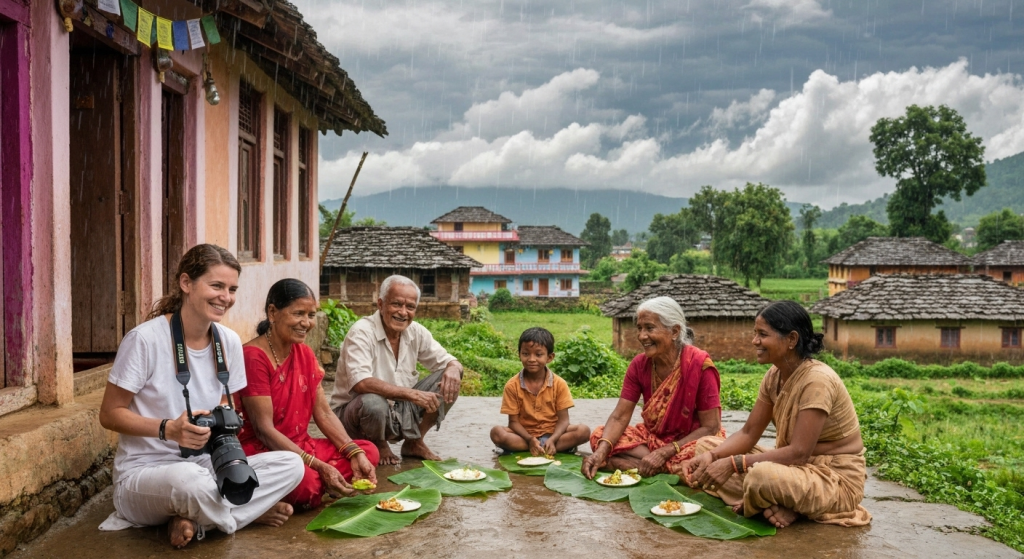
Over my years of travel writing, I’ve collected stories from fellow travelers about their most memorable “mistakes.” These examples show how common these positive outcomes really are.
The Monsoon Blessing in India
Sarah, a photographer from Australia, got stranded in a small Indian village during unexpected monsoon rains. Her train was cancelled, roads flooded, and she had to stay three extra days. The village family who hosted her invited her to document their festival celebrations, resulting in award-winning photographs and lifelong friendships.
The Volcanic Detour in Iceland
Mark’s flight to London was diverted to Iceland due to fog. Instead of waiting in the airport, he rented a car and spent 18 hours exploring the Golden Circle. He called it “the best accidental day trip ever” and returned to Iceland six months later for a proper vacation.
The Language Mix-up in Japan
Emma ordered what she thought was chicken teriyaki but received fermented fish instead. The restaurant owner, apologetic about the confusion, spent the evening teaching her about traditional Japanese cuisine and invited her family to their home for dinner the next night.
Common Fears About Getting Lost (And Why They’re Mostly Wrong)
Many travelers resist embracing uncertainty because of specific fears. Let me address the most common concerns based on both personal experience and traveler research.
“I’ll Waste Time and Money”
This fear assumes that following your original plan is always the most efficient option. In reality, rigid adherence to schedules often leads to rushed experiences and missed opportunities.
When I calculate the actual value of my “mistake” experiences, they consistently provide better stories, deeper cultural insights, and more meaningful connections than planned activities. The extra money spent on alternative transport or accommodation is usually minor compared to the unique value gained.
“I’ll End Up Somewhere Dangerous”
While safety considerations are legitimate, most travel mistakes don’t lead to dangerous situations. Basic research about general safety in your destination, combined with common-sense precautions, provides adequate protection for spontaneous exploration.
Trust your instincts, stay aware of your surroundings, and don’t hesitate to retreat if something feels genuinely unsafe. But don’t let excessive caution prevent you from experiencing authentic local culture.
“I Won’t Have Enough Time for My Must-See List”
This concern reveals a fundamental misunderstanding about travel value. Checking items off a list provides temporary satisfaction, but meaningful experiences create lasting memories.
Consider this: would you rather spend 30 minutes taking photos at a famous landmark with hundreds of other tourists, or spend three hours learning cooking techniques from a local family? Both are valid choices, but one offers deeper cultural connection.
The Art of Productive Getting Lost
Not all forms of getting lost are equally beneficial. Through trial and error, I’ve learned to distinguish between productive wandering and genuine problems that need immediate solutions.
When to Embrace the Detour
Embrace getting lost when you have flexible time, adequate resources, and reasonable safety conditions. The best detours happen when you’re not rushing to catch flights or meet strict deadlines.
Morning and afternoon explorations tend to yield better results than late-night wandering. Locals are more available for interactions, businesses are open, and you can better assess your surroundings.
Solo travel or small group adventures adapt more easily to changes than large tour groups. You can make quicker decisions and take advantage of spontaneous opportunities.
When to Seek Help Immediately
Prioritize finding your way when facing genuine safety concerns, time-sensitive commitments, or resource limitations. If you’re truly lost in an unfamiliar area after dark, focus on getting back to safety rather than exploring.
Weather conditions, political situations, or cultural events might create circumstances where wandering isn’t advisable. Stay informed about local conditions and trust local advice about areas to avoid.
Creating Space for Serendipity in Your Travels
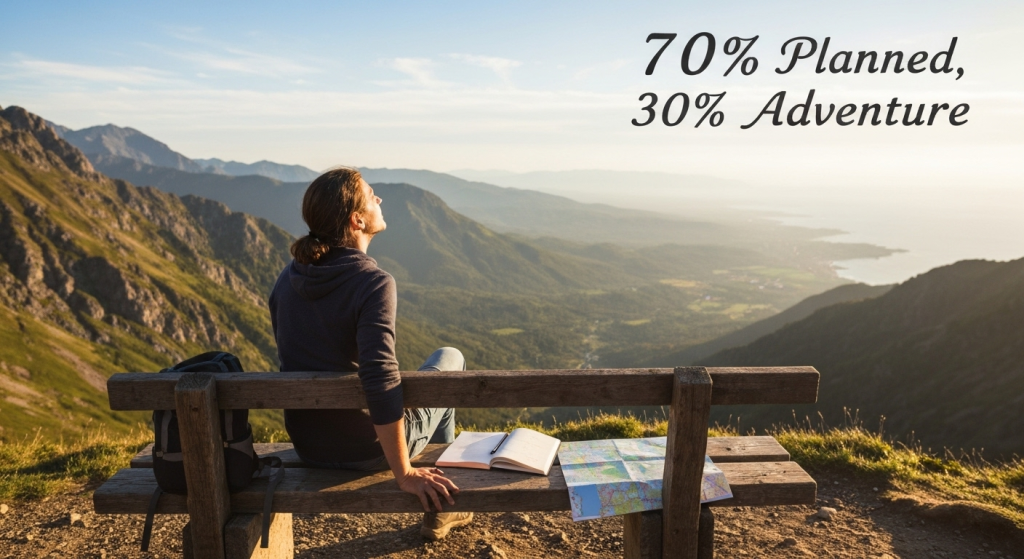
Experienced travelers build flexibility into their itineraries intentionally. Here’s how to design trips that welcome beautiful mistakes while still accomplishing your main goals.
The 70-30 Rule
Plan about 70% of your time and leave 30% unscheduled. This approach ensures you see priority destinations while creating opportunities for spontaneous discoveries.
Book your first night’s accommodation and onward transportation, but leave other days flexible. This security blanket reduces anxiety while maximizing adventure potential.
Buffer Time Strategies
Build extra time around major travel days, important reservations, and must-see attractions. This buffer prevents stress when things don’t go exactly as planned.
Schedule easier days after intensive activities. If you’ve planned a challenging hike or long sightseeing day, follow it with a relaxed day that can adapt to unexpected opportunities.
Technology’s Role in Modern Getting Lost
Smartphones and GPS have changed how we experience being lost, but they haven’t eliminated the value of uncertainty. Smart travelers use technology as a safety net while still embracing spontaneous exploration.
Digital Tools for Safe Wandering
Offline maps provide security without preventing discovery. Download maps before you travel, but resist the urge to constantly check your location. Let yourself wander for a while before confirming your position.
Translation apps help turn language barriers into bridges. Instead of avoiding interactions due to communication fears, use these tools to facilitate conversations with locals who can offer insider knowledge.
Emergency information stored in your phone (emergency contacts, embassy details, accommodation addresses) provides peace of mind that allows for bolder exploration.
| Digital Tool | Primary Function | How to Use for Better Mistakes |
|---|---|---|
| Offline maps | Navigation backup | Check location sparingly to maintain discovery element |
| Translation apps | Communication bridge | Facilitate conversations with helpful locals |
| Local transport apps | Alternative routing | Find creative ways to reach destinations |
| Emergency contacts | Safety net | Reduce anxiety about venturing off planned routes |
Balancing Digital and Analog Navigation
The most rewarding travel experiences often combine digital safety nets with analog discovery methods. Use technology for security, but don’t let it replace human interaction and intuitive exploration.
Ask locals for directions even when your phone knows the way. These conversations often lead to recommendations for hidden gems, cultural insights, or spontaneous invitations.
The Long-term Impact of Travel Mistakes
The benefits of embracing travel uncertainty extend far beyond individual trips. Regular travelers who welcome mistakes develop skills and perspectives that enhance their entire lives.
Personal Growth Through Uncertainty
Navigating travel challenges builds confidence in your problem-solving abilities. Each successful resolution of an unexpected situation proves you can handle whatever comes next.
Cultural adaptability improves through exposure to different ways of thinking and living. When your plans fall apart in foreign countries, you learn to see situations from multiple perspectives and find creative solutions.
Stress tolerance increases as you realize most “disasters” are actually minor inconveniences with positive potential. This perspective shift reduces travel anxiety and increases enjoyment.
Skills That Transfer Home
The flexibility and creativity developed through travel mistakes benefit your professional and personal life. Employers value adaptability, problem-solving skills, and cultural sensitivity – all qualities strengthened by embracing travel uncertainty.
Communication skills improve when you regularly navigate language barriers and cultural differences. These abilities enhance relationships and career opportunities back home.
Frequently Asked Questions
Q: What if I get lost in a country where I don’t speak the language?
A: Use translation apps, gestures, and maps to communicate basic needs. Most people worldwide are helpful to confused travelers, even with language barriers. Learn to say “help” and “thank you” in the local language before you travel.
Q: How do I know if getting lost is safe in my destination?
A: Research general safety conditions before traveling, trust your instincts about specific situations, and maintain awareness of your surroundings. Start with shorter explorations during daylight hours to build confidence.
Q: What should I always carry when planning to get lost?
A: Bring extra cash, offline maps, emergency contact information, and basic first aid supplies. Keep copies of important documents separate from originals, and ensure someone knows your general travel plans.
Q: How do I convince travel companions to embrace getting lost?
A: Start with small, low-risk detours to demonstrate positive outcomes. Share stories of successful “mistakes” from other travelers, and emphasize the unique experiences you’ll gain together. Compromise by planning some structured activities alongside spontaneous exploration time.
Conclusion
Getting lost while traveling isn’t just about navigation mistakes – it’s about opening yourself to experiences you never imagined possible. Through five years of professional travel and countless “wrong” turns, I’ve learned that the best adventures happen when plans fall apart.
The key lies not in avoiding mistakes, but in approaching them with curiosity, flexibility, and openness to connection. Whether you’re ordering the wrong dish, taking the wrong train, or wandering down an unfamiliar street, each detour offers potential for discovery.
Your next trip doesn’t need perfect planning or flawless execution. It needs your willingness to see mistakes as opportunities, strangers as potential guides, and uncertainty as the gateway to authentic experience. Pack your sense of adventure alongside your essentials, and prepare to be amazed by where your beautiful mistakes might lead you.
The joy of getting lost isn’t really about losing your way at all. It’s about finding experiences, connections, and perspectives you never knew you were looking for. Sometimes the best destination is the one you never planned to reach.

